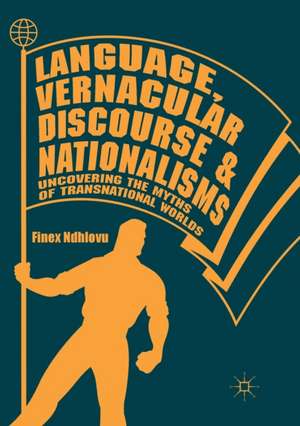Language, Vernacular Discourse and Nationalisms: Uncovering the Myths of Transnational Worlds
Autor Finex Ndhlovuen Limba Engleză Paperback – 8 feb 2019
This book examines the linguistic and discursive elements of social and economic policies and national political leader statements to read new meanings into debates on border protection, national sovereignty, immigration, economic indigenisation, land reform and black economic empowerment. It adds a fresh angle to the debate on nationalisms and transnationalism by pushing forward a more applied agenda to establish a clear and empirically-based illustration of the contradictions in current policy frameworks around the world and the debates they invite. The author’s novel vernacular discourse approach contributes new points of method and interpretation that will advance scholarly conversations on nationalisms, transnationalism and other forms of identity imaginings in a transient world.
| Toate formatele și edițiile | Preț | Express |
|---|---|---|
| Paperback (1) | 586.55 lei 6-8 săpt. | |
| Springer International Publishing – 8 feb 2019 | 586.55 lei 6-8 săpt. | |
| Hardback (1) | 591.96 lei 6-8 săpt. | |
| Springer International Publishing – 27 mar 2018 | 591.96 lei 6-8 săpt. |
Preț: 586.55 lei
Preț vechi: 690.06 lei
-15% Nou
Puncte Express: 880
Preț estimativ în valută:
112.24€ • 120.02$ • 93.58£
112.24€ • 120.02$ • 93.58£
Carte tipărită la comandă
Livrare economică 17 aprilie-01 mai
Preluare comenzi: 021 569.72.76
Specificații
ISBN-13: 9783030094119
ISBN-10: 3030094111
Pagini: 388
Ilustrații: XXI, 388 p.
Dimensiuni: 148 x 210 mm
Greutate: 0.49 kg
Ediția:Softcover reprint of the original 1st ed. 2018
Editura: Springer International Publishing
Colecția Palgrave Macmillan
Locul publicării:Cham, Switzerland
ISBN-10: 3030094111
Pagini: 388
Ilustrații: XXI, 388 p.
Dimensiuni: 148 x 210 mm
Greutate: 0.49 kg
Ediția:Softcover reprint of the original 1st ed. 2018
Editura: Springer International Publishing
Colecția Palgrave Macmillan
Locul publicării:Cham, Switzerland
Cuprins
PART I: SETTING THE SCENE.- Chapter 1: Introduction: Theories, Concepts, Debates.- Chapter 2: Emergent Political Languages, Nation-building, Social Cohesion.- PART II: LANGUAGE, VERNACULAR DISCOURSES, NARROW NATIONALISMS.- Chapter 3: Language Policy, Vernacular Discourse, Empire Building.- Chapter 4: Language, Mobility, People.- PART III: CITIZENSHIP, INDIGENEITY, ECONOMIC EMPOWERMENT.- Chapter 5: Chimurengas, Indigenisation, Black Economic Empowerment.- Chapter 6: Alternative Language of Development and Economic Empowerment.- PART IV: MIGRATION, BORDERS, EXCLUSION.- Chapter 7: Migration, Integration Discourse, Exclusion.- Chapter 8: Australia’s Operation Sovereign Borders: A World without Others?.- PART V: CONCLUSION.- Chapter 9: Conclusion –Transnationalism or Resurgent Narrow Nationalisms?.
Notă biografică
Finex Ndhlovu is Associate Professor of Language in Society at the University of New England, Australia, Distinguished Visiting Professor at the Graduate Center, City University of New York, USA, and Visiting Research Professor, College of Graduate Studies, University of South Africa. His research interests sit at the cutting edge of sociolinguistics of migration and socio-cultural theories around language, identity and sociality in relation to transnational African diasporas; language and development; language and discourses of everyday exclusion. Most recent major publications include Becoming an African Diaspora in Australia (2014); Hegemony and Language Policies in Southern Africa (2015); and Language, Migration, Diaspora: Challenging the Big Battalions of Groupism (2017).
Textul de pe ultima copertă
‘This pathbreaking study shows that anti-(African) immigrant rhetoric is part of a widespread ethno-centric political vernacular and demonstrates how these negative ethnic stereotypes have arisen from severe economic inequalities and the uneven development. This is a deeply grounded analysis of local-level ethno-centrism which places the issue firmly in the context of the local and global political economy. It deserves a wide readership.’
—Don Robotham, City University of New York, USA
‘This is a must read not only for scholars in the emerging field of the sociolinguistics of (de)coloniality and globalisation, but also those interested in language and the political and ideological formations in the construction of nation-states in South Africa, Zimbabwe and Australia.’
—Felix Banda, University of the Western Cape, South Africa
‘Professor Finex Ndhlovu’s is an important voice in the field of language studies. His trade mark being the careful but consistent contextualization of knotty language questions within the broader terrain of equally complex identitarian politics, while at the same time bringing into creative dialogue African and non-African empirical case studies to demonstrate the global implications and resonance of his research findings.’
—Sabelo J Ndlovu-Gatsheni, University of South Africa
This book examines the linguistic and discursive elements of social and economic policies and national political leader statements to read new meanings into debates on border protection, national sovereignty, immigration, economic indigenisation, land reform and black economic empowerment. It adds a fresh angle to the debate on nationalisms and transnationalism by pushing forward a more applied agenda to establish a clear and empirically-based illustration of the contradictions in current policy frameworks around the world and the debates they invite. The author’s novel vernacular discourse approach contributes new points of method and interpretation that will advance scholarly conversations on nationalisms, transnationalism and other forms of identity imaginings in a transient world.
Finex Ndhlovu is Associate Professor of Language in Society at the University of New England, Australia, Distinguished Visiting Professor at the Graduate Center, City University of New York, USA, and Visiting Research Professor at the University of South Africa.
Caracteristici
Offers trans-disciplinary insights for students and scholars of sociolinguistics, critical discourse analysis, African languages, refugee and migration studies, and the history and politics of southern Africa Interrogates taxonomies of nationalism discourse in case studies from Australia, South Africa and Zimbabwe Highlights the contradictions, continuities and disjunctures that punctuate policy frameworks globally and, specifically, in neo-colonial societies
